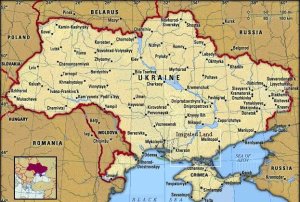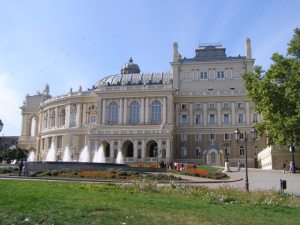H/T to Hieromonk Maximos for this news article.
The relationship between Catholicism and Orthodoxy in Eastern Europe contains some rather thorny history. In the West, where religious freedom is a cornerstone of everyday life, the situation detailed in this news piece would be unthinkable. I say it’s a tragic mistake for Bishops to use their authority to encourage government officials to suppress religious freedom.
Ukraine’s Catholics Fear New Threats to Rights
By Jonathan Luxmoore. Reprinted with permission.

The Ukrainian Greek Catholic Church, traditionally centered in Western Ukraine, entered into union with Rome in 1595.
Warsaw, Poland – Leaders of Ukraine’s Greek or Eastern Catholic church have urged the national government to uphold Catholic rights, after an Orthodox archbishop intervened to block the construction of a church for Greek Catholics in Odessa.
“Under Ukraine’s constitution, all citizens have equal rights,” said Fr Igor Shaban, chairman of the church’s Ecumenical Commission.
“This is also a multi-confessional country, in which several traditional churches have much the same number of members. So it’s illogical and undemocratic to give one particular denomination preference over others.”
The Kiev-based priest was speaking a month after his church’s governing synod asked President Viktor Yanukovich in an open letter to help resolve the church dispute in Odessa.
In an October 4 interview, he said the Greek Catholic exarch, or bishop, of Odessa-Crimea, Msgr. Vasyl Ivasiuk, had recently obtained land, after a decade-long campaign, to build the church in the Black Sea port city.
However, he added that the city council had been persuaded not to vote final approval for the church by Odessa’s Orthodox metropolitan, Ahafanhel Savvin, who sits on the Regional State Administration for Ukraine’s governing Party of Regions.
“Odessa is home to 10,000 Greek Catholics, mostly resettled here forcibly after Siberian labour camp sentences, or sent here to work in the later Soviet years – but Metropolitan Ahafanhel says there are no Greek Catholics in the city,” Fr Shaban said.
“What he did, just as our cause was slowly moving forward, was totally unecumenical. There can be no question of any dialogue while such a situation exists in Odessa, and while Greek Catholics are left with just a single chapel on the first floor of a building.”
The Greek or Eastern Catholic church, which combines the eastern rite with loyalty to Rome, was re-legalised in 1989 after four decades’ Soviet suppression, but has faced numerous property disputes with the largest of Ukraine’s three rival Orthodox churches, which is loyal to Russia’s Moscow Patriarchate and uses the pejorative term “Uniates” for Greek Catholics.
In a September 1 statement to local councillors, Metropolitan Ahafanhel said the “vast majority” of Odessa residents were Orthodox, adding that there were too few Greek Catholics to merit “even a prayer house.”
The metropolitan, whose appeal was carried September 1 by Ukraine’s Religious Information Service (RISU), said the planned church represented “the Uniates’ attempt to aggressively expand in the Odessa region,” and would “create a situation of inter-religious conflict” with Orthodox clergy and laity.
In a September 3 letter to President Yanukovich, Ukraine’s Greek Catholic bishops requested “an authoritative reaction,” adding that the Metropolitan’s statement contained “crying violations of the constitution of Ukraine and inter-confessional peace.”
However, the president’s spokesperson, Hanna Herman, told a mid-September Kiev press conference the government did not “feel competent in such cases because it sees the situation as simply a dispute between churches.”

Odessa, founded in 1794 by decree of Catherine the Great, is the fourth largest city in Ukraine with a population over 1 million.
The secretary of the Ukrainian Orthodox church’s Odessa diocese, Archpriest Andrei Novikov, told Russia’s Interfax newsagency September 27 there was “no visible presence” of Greek Catholics in Odessa, which was “an Orthodox city,” adding that his diocese had received “numerous messages” expressing outrage that the city could host a church “of a confession which blurred its history by co-operating with the Nazi occupation regime and blessing SS members.”
However, in his interview, Fr Shaban said Greek Catholic interests had been prejudiced by close links between Metropolitan Ahafanhel and the local government.
The priest added that the dispute would raise concerns that Greek Catholic rights in Ukraine were endangered under President Yanukovich, a practising Orthodox Christian, who was elected in February on a pledge of closer ties with neighbouring Russia.
“We must hope these are just individual incidents, caused by particular people,” the Greek Catholic Commission chairman said.
“If we don’t react, however, and if the European community doesn’t notice, there’s a risk the problems will be repeated on a wider scale. If Greek Catholics want to pray, I don’t see any reason to bar them.”
Ukraine’s smaller Latin-rite Roman Catholic church has also faced problems in Odessa, where the local Catholic bishop, Msgr. Bronislaw Bernacki of Odessa-Simferopol, went to court in June to seek restitution of the city’s Assumption cathedral and other Catholic buildings.
Catholic churches remain in government hands in other Ukrainian cities, including Dniepropetrovsk, where Catholics resumed a prayer vigil October 1 pending a new court ruling on the local St Joseph church.
In a December 2005 letter to the pope and US President George Bush, Bishop Bernacki said a church in Sevastopol was being used as a cinema, with pay toilets in its former altar section, while Odessa’s former Catholic seminary was occupied by Ukraine’s Transport Ministry, which had withdrawn an agreement to return it after the country’s early 2005 “Orange Revolution.”
Russian Orthodox leaders, whose patriarch, Kirill I, attended Yanukovich’s inauguration, have criticised plans for Benedict XVI to visit Ukraine in early 2012, warning the pilgrimage could endanger recent “significant improvements” in inter-Church relations.
Other articles of interest:
Italian Catholic Episcopal Conference Vetoes Married Priests
Can East and West Co-Exist With Married Priests?
Of Prosphoras and Pre-cut Pieces
Pope & Patriarchs: The 1848 Letters of Pope Pius IX and the Orthodox Patriarchs
This is upsetting. I don’t know what else to say.
Susan Peterson
It is indeed upsetting, but typical. In the wake of the collapse of the Soviet Empire, one has read over and over and over again about formerly persecuted peoples seizing every opportunity to persecute either their former oppressors or erstwhile fellow-oppressed. Orthodox “Christians” are among the worst offenders, but by no means the only ones. Catholics and non-religious nationalists also have frequently abused the rights of others.
That secular sorts should persecute the weak should hardly be surprising. After all, isn’t the only rule for them “survival of the fit?” But that people who claim to be not only followers but worshipers of the Lord who said, “…love one another as I have loved you…by this all men shall know that you are my disciples,” this is heartbreaking. Or ought to be, any road. Articles like this make me wonder whether Christians know, or even care, what love really means. You can almost hear them saying, “…and who is my neighbor?”
Kevin
Certainly, not everyone feels the same way about this situation or it would not play out in the religious press. There are a great many people on both sides (Catholic and Orthodox) who are bothered by such antics and that is the primary reason it was posted here.
It doesn’t follow that all Christians are to blame, however — or all Orthodox, or all Catholic. That only perpetuates religious hatred.